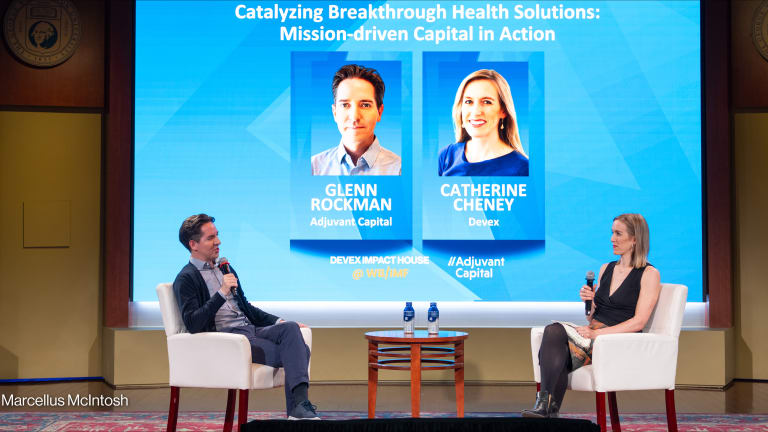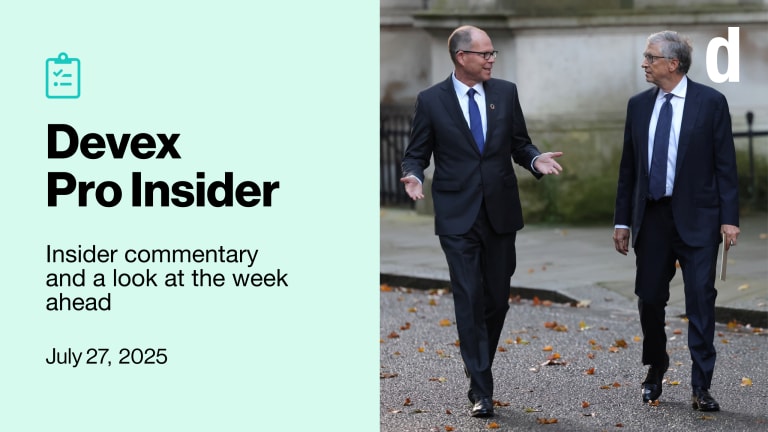The case for health as a high-return investment
How can the Global Financing Facility Trust Fund bring down the cost of engaging the private sector in global health? Mark Suzman, president of global policy, advocacy and country programs at the Bill & Melinda Gates Foundation, explains in this exclusive interview.
One of the biggest initiatives to come out of last month’s third International Conference on Financing for Development in Addis Ababa, Ethiopia, was the Global Financing Facility Trust Fund. Launched in support of the United Nations’ Every Woman Every Child initiative, it was able to align $12 billion in public and private resources towards financing country-led five-year investment plans for women’s, children’s and adolescents’ health. The Bill & Melinda Gates Foundation has pledged $75 million over five years to the GFF — along with pledges from several governments, donors and private sector companies — in order to kick-start GFF implementation in four front-runner countries: the Democratic Republic of the Congo, Ethiopia, Kenya and Tanzania. On the sidelines of the Addis conference, Devex spoke with Mark Suzman, president of global policy, advocacy and country programs at the Gates Foundation, on this initiative and other innovative financing mechanisms for health. Here are some highlights from our conversation: How will your organization ensure that your commitment to GFF reaches the most vulnerable women and children in developing countries? The Gates Foundation is supporting the GFF due to our positive experience with [Gavi, the Vaccine Alliance] and the [Global Fund to Fight AIDS, Tuberculosis and Malaria], which have demonstrated the power of pooled finance for driving down costs of commodities and antiretrovirals, which has led to dramatic increases in access at community level. The GFF is a mechanism to pool donor finance against a key set of objectives across the spectrum of reproductive, maternal and child health. This is an important conceptual breakthrough with regard to these health issues that have, to some extent, been siloed during the past years for historic reasons. The GFF will allow us to address them in an integrated, health-systems-centered way, by pooling donor funding to finance related national strategies. The GFF will also support Every Women Every Child’s new 2.0 strategy, to be launched at the U.N. General Assembly in September. This strategy looks at issues such as family planning, nutrition and newborn health, among others, for which countries will present costed plans to be match-financed by donors. Family planning is one of the most important areas here as it will help to considerably drive down mother and child mortality. In addition, the GFF will incentivize governments to take up highly concessional [International Development Association] loans for nontraditional sectors such as the ones targeted by EWEC. How do you go about convincing governments to take up loans for health? The Gates Foundation believes that health is a high-impact investment in terms of development outcomes. There is already ample evidence for that, as proven by the Commission on Investing in Health supported by the Gates Foundation. Conservative estimates have shown that human capital gains and a healthy workforce have a high economic return and are a pillar for growth. That vision and argument is one we would like to make to developing country governments. In this context, a loan is merely one of the tools already used by governments in other sectors — its advantage being that it allows for long-term investments and looking at outcomes instead of 2-3 year outputs. When it comes to paying back loans in those sectors, how do you propose to avoid countries being thrown into unsustainable debt? Any initiative that leads to unsustainable debt would not be a desirable outcome. We have learned the lesson of the debt relief era of the late 1990s and early 2000s of how damaging that could be. However, as a new wave of developing countries are on stronger fiscal footing these days — in the way they manage their finances and investments — the smart use of grants to leverage additional finance will help maximize the impact of funding. Having said that, there is nothing new about using IDA loans for development: Having the World Bank as a partner is a way of ensuring that it is done in a restrained and manageable manner and that it is part of a country’s broader financial planning. Moreover, mechanisms such as the GFF should reduce a lot of transaction costs — for example, multiple donor reporting mechanisms that are currently burdening country governments. Aside from GFF, the health sector seems strikingly absent when it comes to new financing mechanisms. Do you have any best-practice examples of health PPPs, bonds, SME funds or other types of new financing in the health sector? Many donors have indeed traditionally separated out their trade and private sector and credit institutions and health assistance. FFD is a great moment for encouraging new ways of merging these sectors. From our point of view, the best example for a very effective health PPP continues to be Gavi, which has recently had its largest replenishment in terms of funding. By pooling resources to drive down the costs for private sector parties for manufacturing vaccines, it has saved over 7.5 million lives. The Gates Foundation is a key investor to Gavi because we see its value for money. Gavi is also continuously looking at how to improve and refine its funding mechanisms. The International Finance Facility for Immunization — or IFFim — co-financed by various donor countries is one example of how to use bonds for health: It uses long-term pledges from donor governments to sell “vaccine bonds” in the capital markets, making large volumes of funds immediately available for Gavi. Another example of a new initiative — co-funded by the Gates Foundation among many other donors — is the Sustainable Development Investment Partnership, which launched in Addis on July 15. Its aim is to mobilize $100 billion in private financing over five years for infrastructure projects in a variety of sectors, including health, in developing countries, using development assistance to reduce risk. The SDIP and GFF have only just been launched, but we are cautiously optimistic that they will help bring down the cost of engaging the private sector. Lessons learned will be drawn from the implementation that is about to start and, by next year, we should have a better idea of how these mechanisms can best work for health. And in your view, what are the most innovative aspects of the Addis Ababa Action Agenda? What is new about the Addis action agenda is that it is based around three interlinked pillars: official development assistance, domestic resource mobilization and private sector finance. Moreover, the tone has changed: It is about establishing a genuine partnership with the private sector. This should not come as an excuse for reducing ODA — it should be “both/and” rather than “either/or.” This is all the more important for sectors such as health where needs are larger than ever before: We now need to look at how to make the best use of ODA funding to leverage much greater volumes of financing. What would be your key message to the global development community on how to best use new financing mechanisms for health and the social sectors? Investing in social sectors provides a high return for a society as it constitutes a long-term investment in human capital, which is a fundamental pillar for sustainable economic growth. Let’s take advantage of the new initiatives and mechanisms launched in the context of the FFD process in order to find the best practices and solutions for health, while not losing sight and track of past successes and building on initiatives that have already been proven to work. Want to see more coverage of the SDGs? Check out Sustaining Development in partnership with Chevron, FXB, Global Health Fellows Program II, Philips, Pfizer, UNIDO, U.N. Volunteers and the U.S. Council for International Business. You’ll find more Devex news coverage of the SDGs like this article, plus opinion pieces, video interviews, and content provided by our partners.
One of the biggest initiatives to come out of last month’s third International Conference on Financing for Development in Addis Ababa, Ethiopia, was the Global Financing Facility Trust Fund. Launched in support of the United Nations’ Every Woman Every Child initiative, it was able to align $12 billion in public and private resources towards financing country-led five-year investment plans for women’s, children’s and adolescents’ health.
The Bill & Melinda Gates Foundation has pledged $75 million over five years to the GFF — along with pledges from several governments, donors and private sector companies — in order to kick-start GFF implementation in four front-runner countries: the Democratic Republic of the Congo, Ethiopia, Kenya and Tanzania.
On the sidelines of the Addis conference, Devex spoke with Mark Suzman, president of global policy, advocacy and country programs at the Gates Foundation, on this initiative and other innovative financing mechanisms for health.
This story is forDevex Promembers
Unlock this story now with a 15-day free trial of Devex Pro.
With a Devex Pro subscription you'll get access to deeper analysis and exclusive insights from our reporters and analysts.
Start my free trialRequest a group subscription Printing articles to share with others is a breach of our terms and conditions and copyright policy. Please use the sharing options on the left side of the article. Devex Pro members may share up to 10 articles per month using the Pro share tool ( ).
Sibylle Koenig is a development consultant and policy adviser with 10 years of experience in managing, monitoring and evaluating international aid programs and grant schemes, as well as advocacy. She has worked for a variety of organizations, including the European Commission, U.N. and bilateral aid agencies and NGOs in Latin America (4 years) and Europe, with extensive work travel to Africa (Tanzania, Uganda, Mozambique, Kenya, Botswana) and Asia (Cambodia, Vietnam, Thailand, India, South Korea).








